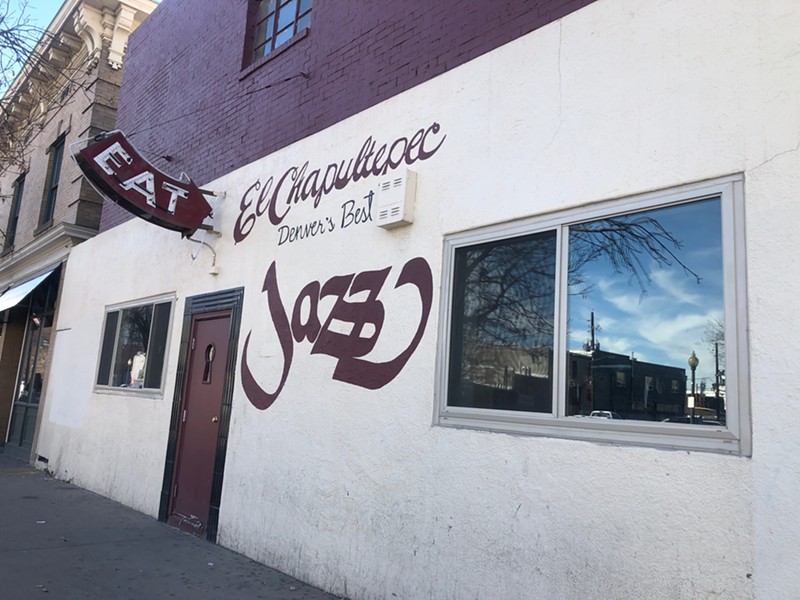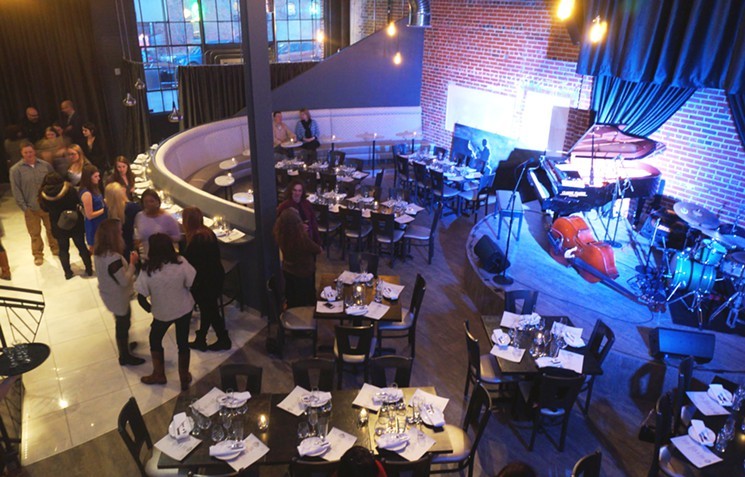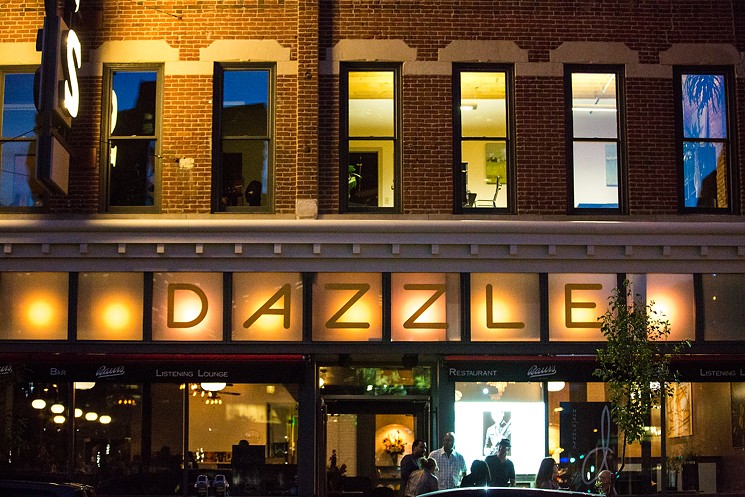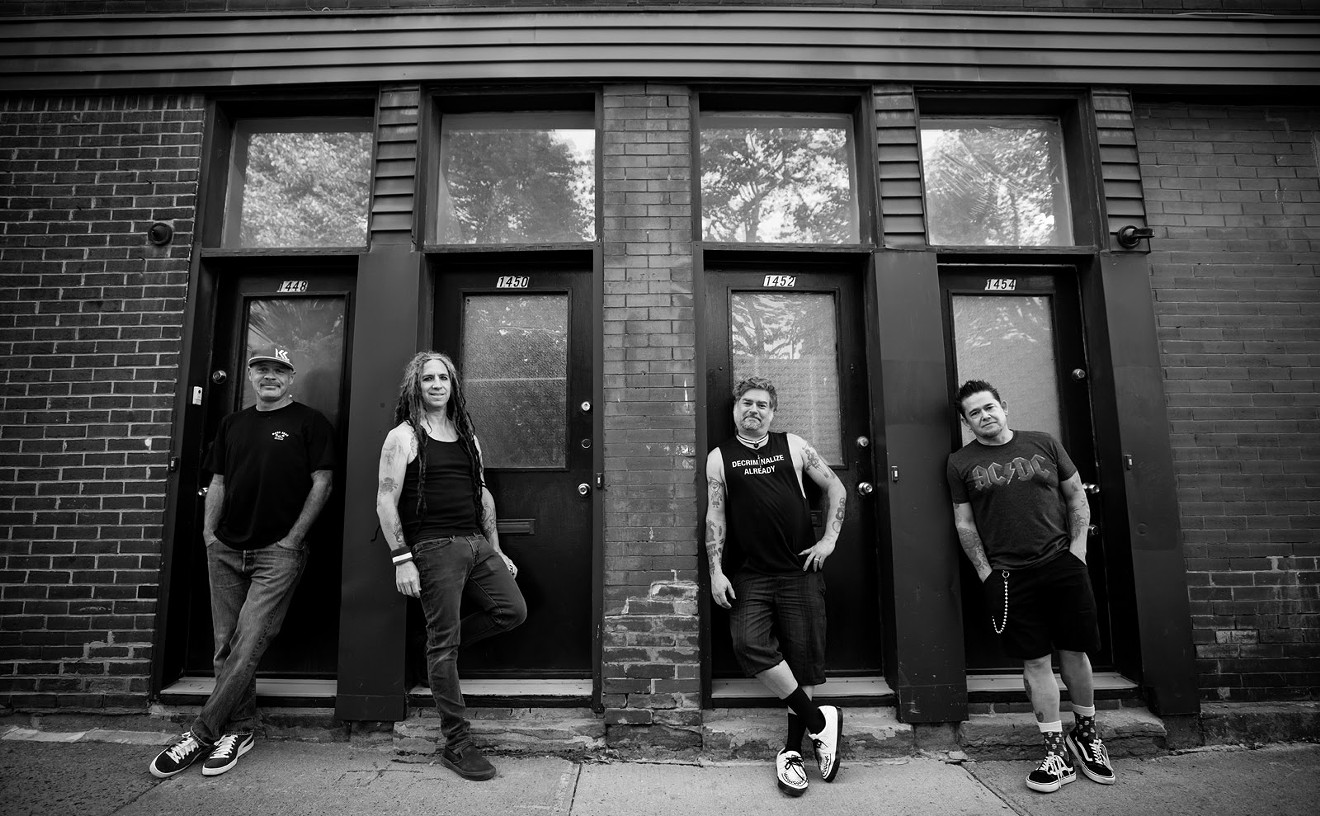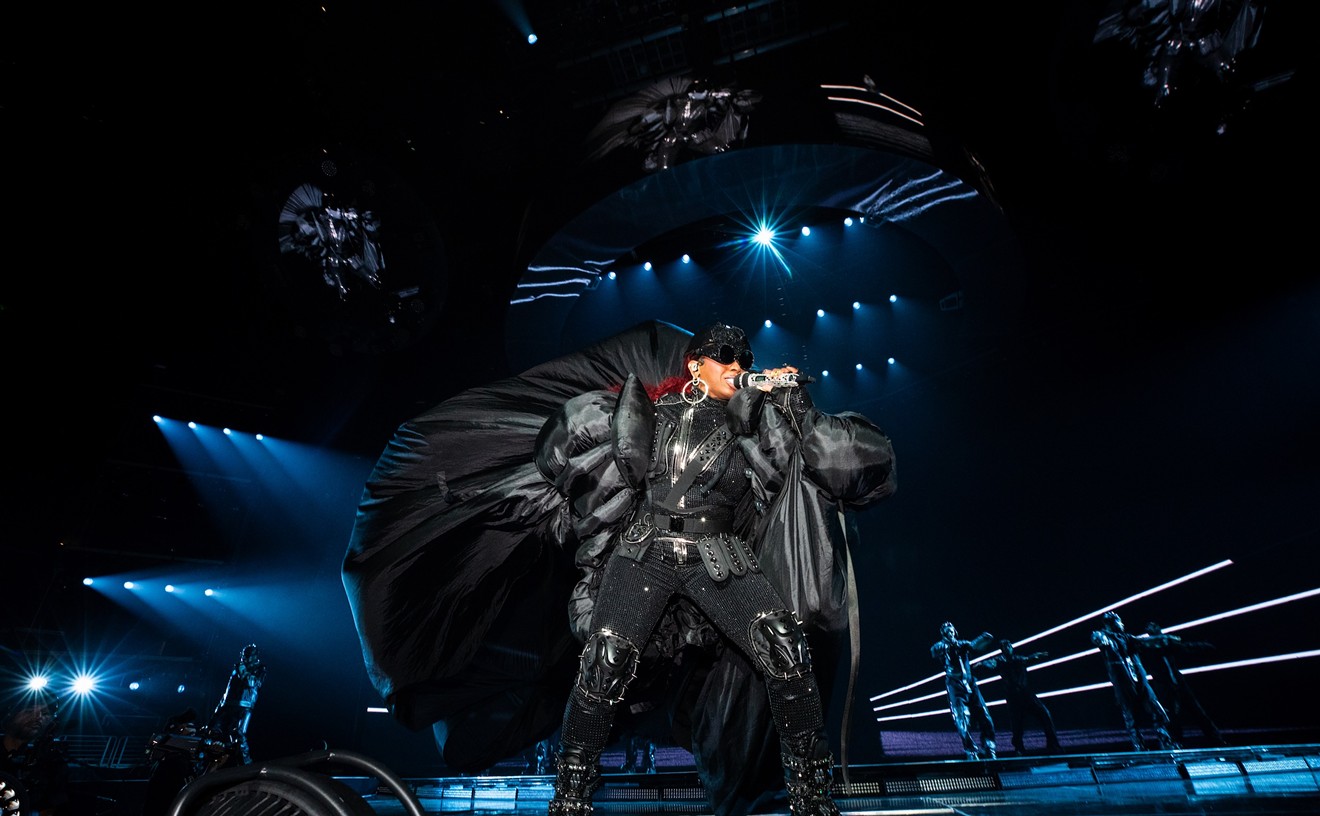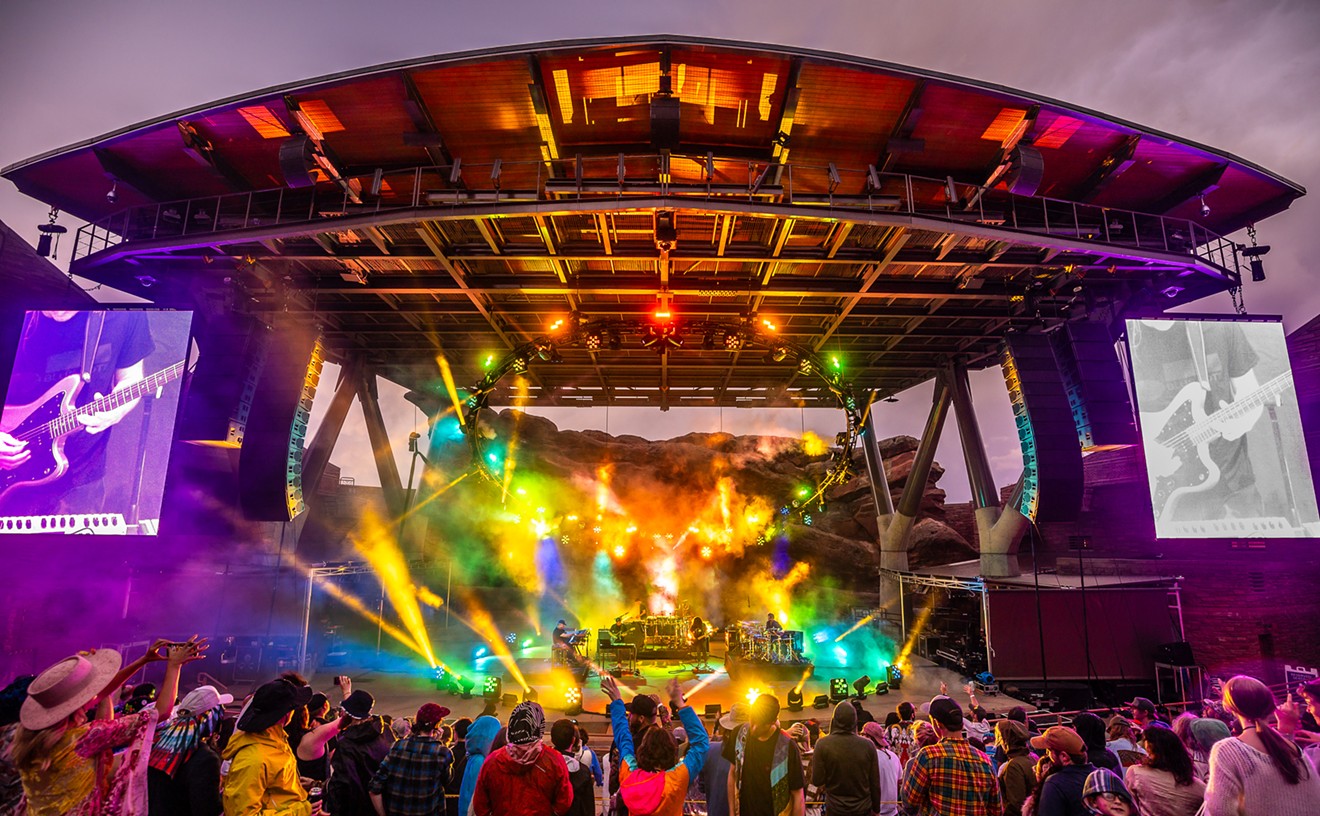That became most obvious in early December, when legendary bar El Chapultepec closed after nearly nine decades. It was the third jazz venue to shut down since COVID-19 arrived. Clubs like Dazzle and Nocturne are doing what they can to stay afloat, and less traditional spots like the Mercury Cafe and Muse Performance Space in Lafayette are relying on goodwill to weather the pandemic.
Before COVID-19, Denver boasted a long jazz tradition, stretching back to the 1920s, when Five Points was known as the "Harlem of the West" and jazz greats frequented town. El Chaputepec, which opened the day after Prohibition ended and originally offered mariachi music, eventually became a bar where young jazz musicians honed their chops and royalty like Ella Fitzgerald, Chet Baker, Tony Bennett, Eddie Harris and many more came to play.
The bar had been in the same family for decades. It was owner Jerry Krantz — who'd inherited El Chapultepec from his father-in-law, Tony Romano, in 1968 — who turned it into a jazz club. Angela Guerrero and Anna Diaz, Krantz’s daughters, took over the bar after he died in 2012, and it was under their ownership that the Pec finally closed for good.
“I want to make sure we're not going to be too quick to point the finger at COVID and our shutdowns for being the reason for this closure,” Diaz said at a December 8 press conference. “Undoubtedly, that makes an impact in our decision. But there are so many things that led to this choice."
In the mix: Rockies fans disrupting shows after games, safety concerns from nearby tent cities, and LoDo drunks pouring out of Market Street bars, explained Diaz. "It's just really taking a toll on us. And it's just that Denver's different than it used to be, and 20th and Market is different than it used to be.”
While the Pec, the city’s longest-running jazz venue, was the most significant spot to close, it wasn't the first. Last May, Live @ Jack’s shut down after a two-decade-long run, and La Cour, which opened in 2014, soon followed.
Live @ Jack’s owner Sandra Holman-Watts decided to close because she didn’t want to take out a government loan during a pandemic with no end in sight. In May, she said of the live-music industry: “We were the first to close, and we're going to be the last to open. We're going to be under ridiculous restraints. We've been mandated to close down for two to three months. That’s zero income, because we aren't restaurants or retail and have no other outlet to make money.”
Back then, being closed a few months sounded bad. Nine months later, little has changed, people are deeper in debt, and federal relief checks have yet to arrive.
Chris Zacher, head of Levitt Pavilion Denver and co-captain of the Colorado chapter of the National Independent Venue Association, notes that since March, venues across the state have been thwarted by the pandemic.
“While there was a brief period of time in which we could produce shows, the capacity limitations made breaking even extremely challenging,” Zacher says. “The announcement a month ago stating that we were moving into Level Red shuttered those who were producing limited-capacity shows. However, entering the winter season had already done that, for the most part. To date, we have lost a handful of venues, thousands of jobs, and have been forced to take on debt to survive."
Without federal support, CIVA [the Colorado Independent Venue Association] and NIVA estimated that upwards of 90 percent of the venues across Colorado would be shuttered by the end of quarter one, 2021," Zacher added.
As of this writing, a bipartisan federal aid package awaits the president's signature. "We’re not across the finish line until the ink is set and dried,” Zacher says. "This relief package, combined with the vaccine, is what is going to save us.”
While the pandemic has been responsible for the loss of three Denver jazz venues already, Dazzle and Nocturne keep soldiering on, which has been even more difficult under the recent restrictions.
Like most venues, Nocturne was dark from mid-March to June, when venues were allowed to reopen with reduced capacity. Since then, the RiNo jazz venue and supper club has hosted 116 live performances. That stopped on November 20, when Level Red went into effect.
“It broke our hearts to have to cancel all the musicians again and furlough our staff of fifteen again,” says Nicole Mattson, who owns the venue with her husband, Scott Mattson. Their spot had a staff of 25 before the pandemic. “Now we've turned to weekly live streaming, Saturday night takeout and virtual cocktail classes as a way to stay connected with our community.”
During the six months Nocturne was open, the club prioritized the safety of guests, employees and musicians.
“I'm proud to say that to my knowledge, having over 6,000 guest visits over that time, there were no outbreaks or reported exposures to COVID-19,” Mattson says. “We started offering free tests to employees in October, and never had a test come back positive. We were all doing our part while still providing an opportunity for guests to enjoy some live music and for musicians to be together on stage.”
Donald Rossa, owner of Dazzle, says business was good after his club was allowed to reopen, but he still needed to take out a large emergency COVID-19 small-business loan — a risk he was willing to take.
Rossa tried to offer curbside food, but it was useless, as downtown has been a desert during the pandemic. In recent months, he and Dwight Thompson, Dazzle's director of marketing, started Dazzle Presents, a booking company that could replace Dazzle's brick-and-mortar location if it comes to that. If six months pass and no federal aid has arrived, the club could potentially close.
Even so, Rossa has been trying to help local musicians. Many haven’t been gigging since the pandemic began, and some are so broke they can't afford to eat, he says. In early December, he launched Bread & Jam, turning his jazz club and partner venues like Muse Performance Space into soup kitchens offering free food to musicians.
Rossa just wants to make musicians feel good "and let them play their music and make sure that music doesn’t die," he says. "That's the best therapy for them." Early on in the pandemic, Dazzle joined forces with Mighty Fine Productions to produce live-streamed shows to give musicians some income. Eventually, Rossa invested in video equipment to stream concerts on his own from Dazzle.
Lafayette's nonprofit Muse Performance Space, which saxophonist Pete Lewis and drummer Clare Church opened in 2018, started live-streaming concerts from a phone on March 13. Over the past few months, they've purchased pro gear to up their game and started accepting donations for live-stream concerts. Their goal is to help musicians “get the music out to a hurting world, whether people can pay or not.”
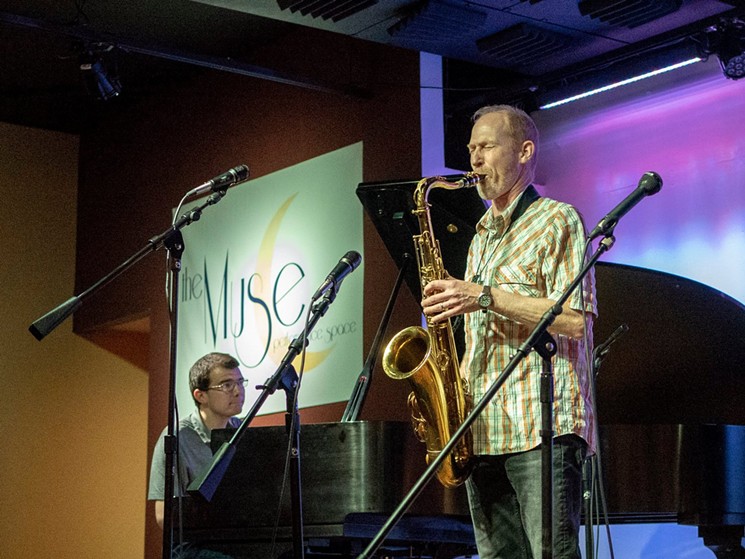
Saxophonist Pete Lewis performs at the Muse, the Lafayette venue that he operates with his wife.
Courtesy of The Muse Performance Space.
“They are universally grateful to have a place to present their music, and they are happy to receive any remuneration,” Church says. “But many times, we can only give them what we consider to be the absolute minimum one can offer a professional, because it's all we can afford. The best way for folks to help is to watch a live stream, give the musicians some kudos in the comments and donate a little if they can. If they want to do more, they can become Patreon members and help keep this beautiful space for music, art and community going strong.”
The Mercury Cafe has also been doing its part to keep the music alive. The restaurant and venue, which opened in 1975, has been at 2199 California Street for the past three decades; it has survived the pandemic so far because of donations to a GoFundMe campaign, which has raised more than $80,000.
Music has always been a big part of the Mercury, which famously hosted punk acts like Black Flag and TSOL in the ’80s, rock bands like Radiohead and Killing Joke in the ’90s, and more than a few emerging and avant-garde acts with few other places to perform.
Since June, the Merc has offered weekly jazz shows, including jams with the Gabe Gravagno Trio, whose members owner Marilyn Megenity describes as "young, experimental guys with real chops.” On Fridays, pianist Sam Amable has played old-school boogie-woogie.
“I tell people all the time, local organic food is your birthright, and I think my music is, too,” Megenity says. She misses the big bands at swing-dance nights, but dancing hasn't been permitted since the first round of closures in March. She’s also looking forward to the Wednesday night open mics again.
“I really think it's important to have young musicians have a place to develop,” Megenity says. “If you get a regular gig or you're playing in front of people, it changes you as a musician. [Your] growth is phenomenal.”
And after being cooped up for months, musicians have been thrilled to play at these venues. When Nocturne reopened in June, Mattson says, it was remarkable to hear the passion they poured out on stage.
“So many musicians expressed their gratitude for being able to perform in front of an audience,” she recalls. “Even at 25 percent capacity and curfews, we still made it work. There were enough guests to support paying bands each night, and we had the joy of hosting so many birthdays, anniversaries, marriage proposals and other reasons to celebrate.
“I think our community was really aching for music, food and drink, and we were glad to be able to provide that from June to November," she says. Both musicians and guests wrote in, thanking Nocturne for keeping music going. "I'm personally immensely proud of our team of employees for providing such great hospitality despite all the challenges in the ‘new normal’ of restaurant service during a pandemic. They are such a wonderful group of humans, and I can't wait to bring them all back to work.”
As for the future, Mattson hopes the city and state will offer a proposed 5 Star State Certification Program, a Colorado Department of Health project that "encourages businesses to implement safety measures beyond what is already required by Public Health orders and guidelines that will help slow the spread of COVID-19, and in doing so, be able to accelerate their reopening."
“I'm confident that we would qualify and then possibly be able to go back to operating responsibly,” Mattson says. “It's important to us that we get back to supporting live music as soon as we can in order to support the musicians and keep our jazz scene alive and thriving as much as it was before 2020 hit us all so hard.”

